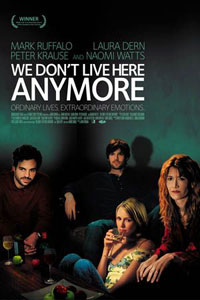We Don't Live Here Anymore (R) ★★
 We Don't Live Here Anymore is much easier to admire than it is to enjoy. It is a tour-de-force of acting, but only in the service of profoundly helpless, self-absorbed, and unhappy characters chattering endlessly about their lives as if they are all that matter in the universe.
We Don't Live Here Anymore is much easier to admire than it is to enjoy. It is a tour-de-force of acting, but only in the service of profoundly helpless, self-absorbed, and unhappy characters chattering endlessly about their lives as if they are all that matter in the universe.
Story
Jack and Terry (Mark Ruffalo and Laura Dern) are an unhappy couple, stifled by years of sullen, barely concealed rage, Jack's inertia, and Terry's drinking. Their friends Hank and Edith (Peter Krause and Naomi Watts) are similarly miserable with each other, which they act out through barely concealed affairs. As Jack and Edith begin their illicit tryst, they instinctively seek to pair up Hank and Terry, partly to make it easier for them to sneak around, but mostly to alleviate their own guilt. So the two couples basically substitute one rut for another, wheels spinning in the muddy morass of their own confused attempts at adulthood. Through it all, their children become a sort of juvenile Greek chorus for their parents, making the kinds of precocious pronouncements that are only uttered from the mouths of screenwriters.
Acting
As joyless as the movie is to sit through, the acting is brilliant. Krause (Six Feet Under) tosses his nonchalance around as an impenetrable shield, caring so little that he's impossible to wound. Ruffalo (Collateral), who is the most (and probably the only) human of the quartet, provides the only thing approaching a moral center. And even in this company, Dern manages to act circles around them. Her Terry is a definitive portrait of the party girl who finally wakes up hung over one morning only to discover she's got two kids to feed, a house to clean and a husband who'd rather talk than make love. To her, love means always having to admit you're desperate. So it's sad and chilling to watch her begin her affair with Hank only because, in her own twisted way, she thinks her husband wants her to.
Watts is still the most compulsively watchable actress working today, summoning reserves of inner turmoil on cue and yet always making it look effortless. It is interesting to contrast her role here with her work in the far superior and brilliantly written 21 Grams. Both characters are deeply unhappy people trying to make sense of the cruel world. And yet 21 Grams, which is much unhappier and more despondent, achieves a sublime grace as each character discovers their humanity in their desperation. In this movie you just hope that at some point the four main characters will jump in an SUV that has faulty brakes.
Direction
The two men are college professors, and the movie makes the most of that milieu, with flirtatious students, college bars, and long leafy runs providing the backdrop. But most of the movie's plotting feels like its been done on graph paper. Jack and Terry make love. Cut to Hank and Edith making love. Jack talks to his daughter. Cut to Edith talking to her daughter. The rhythm of this duet becomes numbing. The movie is directed by John Curran, an Australian making his first American feature. But the impetus for the story comes from screenwriter Larry Gross, adapting two short stories by Andre Dubus, who wrote In the Bedroom. Dubus' movie characters are all variations on the same emotionally stifled yuppie theme, although In the Bedroom saved itself by turning into an old-fashioned revenge melodrama. We Don't Live Here Anymore is one of those movies, and there have been oodles, where the characters are so inert that the suspense, if one can call it suspense, is who will act first to break the circle of despair. And so the children, of course, are trotted out as pawns on the chessboard, forcing the kings and queens to choose. I don't know which is more depressing: that this movie cliché has been used so often, or that there are undoubtedly thousands of couples in the world who act exactly like this.
Bottom Line
Whining, complaining, bickering and navel-gazing do not equal character development, in this throwback to '70s relationship movies.
To get the full Quicklook Films experience, uncheck "Enable on this Site" from Adblock Plus
box office top 10

Civil War Released: April 12, 2024 Cast: Kirsten Dunst, Wagner Moura 11.1M

Abigail Released: April 19, 2024 Cast: Melissa Barrera, Dan Stevens 10.2M

Godzilla x Kong: The New Empire Released: March 29, 2024 Cast: Rebecca Hall, Brian Tyree Henry 9.5M

The Ministry of Ungentlemanly Warfare Released: April 19, 2024 Cast: Henry Cavill, Eiza Gonzalez 9M

Spy x Family Code: White Released: April 19, 2024 Cast: Takuya Eguchi, Saori Hayami 4.9M

Kung Fu Panda 4 Released: March 8, 2024 Cast: Jack Black, Viola Davis 4.6M

Ghostbusters: Frozen Empire Released: March 22, 2024 Cast: Paul Rudd, Carrie Coon 4.4M

Dune: Part Two Released: March 1, 2024 Cast: Timothée Chalamet, Rebecca Ferguson 2.9M

Monkey Man Released: April 5, 2024 Cast: Dev Patel, Sikandar Kher 2.2M

The First Omen Released: April 5, 2024 Cast: Nell Tiger Free, Bill Nighy 1.7M






